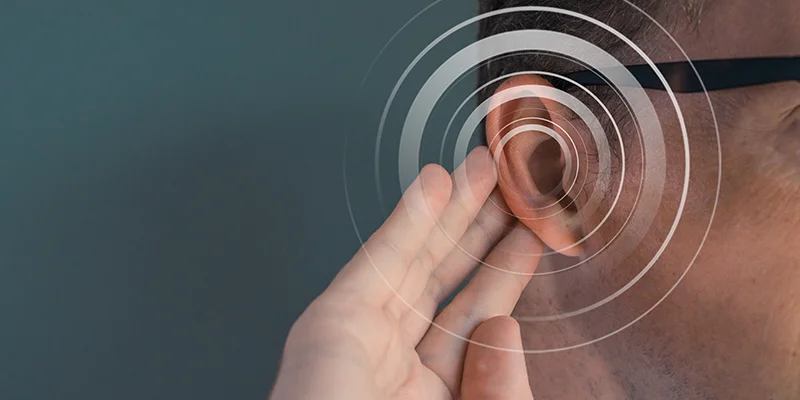Hearing Loss ďż˝ How Common Is It?
As per a study by the WHO, by 2050, it is estimated that 1 in 10 people, which translates to roughly over 700 million people, will have debilitating hearing loss. Hearing loss is a common condition, and difficult to estimate how common it is.
Signs and symptoms of hearing loss
These include the ones given below:
- Difficulty in understanding the words in a public place.
- Needing to increase the volume of the radio or television.
- Asking others to speak clearly or loudly.
- Facing problems hearing the consonants, like the words with sounds of Z, B, T, G, and H.
- Dampening of speech.
- Withdrawal from social gatherings and conversations.
How can hearing loss occur?
Hearing loss can occur due to any of these factors at different stages of life, such as:
- In prenatal period: Genetic disorders or any intrauterine infections.
- In the perinatal period: Low birth weight, jaundice in the neonatal period, asphyxia at birth, other morbidities, and their management.
- Childhood and growing years: Meningitis, chronic ear infection, collection of fluid in the ear.
- Adulthood and older age:
- Smoking
- Ear infection
- Age-related sensorineural degeneration or sudden loss
- Chronic disease, smoking
- Accumulation of earwax
- Abnormal growth of any bone in the ear.
- Damage to the inner ear (hair or nerve cells in the cochlea get damaged due to loud noises or ageing)
- Ruptured eardrum due to sudden blast near the ear, changes in pressure, infection, or poking eardrum with any object.
- Hereditary
- Ageing
- Certain Medications and illnesses
- Any trauma to the head or ear.
Diagnosis for hearing loss
Certain tests are conducted to diagnose hearing loss and its level.
- Screening tests
- Physical examination
- App-based hearing tests
- Tuning fork tests
- Audiometer tests
Hearing loss prevention
- Protect your ears from loud noises
- Avoid using power tools
- Get your hearing tested regularly
- Develop safe listening habits
- Immunisation of children
Hearing loss treatment
Treatment is purely based on the reason for the hearing loss, and it can be one of the following:
- Surgical procedure
- Removal of wax blockage
- Hearing aids
- Cochlear implants
Devices to help with hearing loss
There are devices in the category of assistive listening devices like mobile apps, alerting devices, and cochlear implants to help you with hearing loss. Many devices are available over-the-counter; consult the doctor to understand and use the one suitable for you.
Types of Hearing impairment
- Sensorineural hearing loss: involves damage to the inner ear or the hearing nerves. It can result from injury, ageing, disease, certain drugs, or exposure to loud noise.
- Conductive hearing loss: It involves the outer or middle ear when sound waves cannot travel to the inner ear. It occurs due to the presence of foreign objects like wax in the ear canal, some infection in the bone or injury of the eardrum, or some fluid in the ear space.
- Mixed hearing loss: it is a hearing loss due to the combination of both sensorineural and conductive.
- Presbycusis: It is age-related gradual hearing loss in both ears, as the inner ear changes with age.
- Tinnitus is a condition usually faced by older people when they hear ringing in the ears, and the cause is not any external sound.
How to cope with hearing loss?
It is always better if you make little changes in your communication pattern, like:
- Inform your friends and relatives about your hearing problem.
- Turn towards them when you want to talk to them.
- Ask others to speak slowly, if not very loudly.
- Turn off any background noise you have.
- Choose a noise-free place to talk.
- Use a hearing aid in public.
Hearing and cognitive health
Hearing loss in older people may lead to depression, as they find it challenging to communicate and sometimes feel isolated. If hearing loss is treated, it positively affects social interaction, memory, and cognitive performance.
The hidden dangers of untreated hearing loss
It can impact life in many ways, such as:
- Affecting education and employment
- Communication and social skills
- Isolation and loneliness
- Lower confidence
When to see a doctor
Once diagnosed, treatment options vary depending on the hearing loss and the severity of the symptoms. Consult a doctor immediately if you experience sudden hearing loss. In case of age-related hearing loss, it is gradual, and when it starts affecting your everyday life, please do pay a visit to the doctor.
Conclusion
Hearing loss is a common condition that can seriously impact your life. If you’re experiencing any of the signs or symptoms listed in this article, you must get evaluated by a doctor immediately. Once diagnosed with hearing loss, many treatment options are available to help restore your hearing. We hope this article has helped you understand hearing loss and how it affects people like us.

